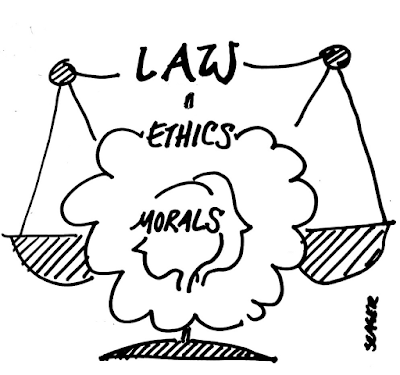·
Morality can be understood as set of principles that outline
correct (virtuous, proper) conduct of an individual. Normally philosophy is the
basis for morality, and often that philosophy is based on religion. Morality
aims at achieving perfection of the individual through ‘right understanding’
and ‘right action’, though it often has social and interpersonal impact.
·
Ethics can be understood as set of principles that outline
correct (virtuous, proper) behavior within a community or society. Ethics is
based in some philosophy that generally speaking is more secular and analytic.
Ethics aims at achieving perfection in society through proper pro-social
understanding and behavior.
·
Law are set of rules adopted by a community or society that
are meant to reflect and enforce moral or ethical principles. Actually law
intends to encourage moral or ethical behavior; in its worst sense law becomes
a mere tool for punishing wrongs against moral or ethical authority.
Humans
have a natural — I’m tempted to say uncontrollable — tendency to organize
themselves into communities. We instinctively create, enforce, and
institutionalize rules that make for an effective, cooperative social life
which is the common root of ethics, morality, and law. Basic principles of
ethics and/or morality were laid down thousands of years ago, often attributed
to individual teachers, though it is often difficult to determine whether these
people existed in history, or were composites made from teachings
from different sources. Hammurabi, Krishna, Laozi, Moses, Plato, Aristotle,
Buddha, Confucius, Jesus… all of these are taken as sources of traditional
moral, etical and legal teachings. We can distinguish between traditions which
focus on externalized forms and those which focus on internalization:
externalized forms depend more on law and social power to achieve their goals,
while internalized forms depend more on what individuals striving to achieve.
Therefore Mosaic Law is highly externalized where Buddhist teachings are highly
internalized. There is not always a clear distinction, actually. Ethics and
individual virtue both were taught by Aristotle, along with a dynamic interaction
between the two; Jesus largely taught internalized forms, but the Christian
church adopted externalized practices later on in life.
With
the rise of philosophical Liberalism, In the West, since perhaps the 17th
century, there has been a consistent shift away from religious morality to
secular ethics, and from broadly externalized forms to more internalized forms.
For instance, the Protestant revolution pursued in a way to break free of the
overbearing legalism of the Catholic church and create smaller, more
individually focused on faith, and the flooding of Buddhist and Hindu teachings
during the 19th century was mirrored by an increase in Gnosticism (Christian
mysticism), all of which had a distinct effect on Western culture. Rise of
secularism subsequently led to rise of philosophers like Kant and Hegel, who
tried to rationalize Christian morality in secular terms, and later people like
Heidegger, Sartre, Nietzsche, Kierkegaard, and others who tried
to break free from the terms of the Christian Morality entirely and construct a
completely new modes of ethics or morality based in individual experience.
There are goodness in those insights, though to a large extent all of these
risk the nihilist moment, in which morality, ethics, and law collapse to mere
preference and lose their social authority.
The relationship between morality, ethics, and law is actually
full of complexities.

Commendable 👏
ReplyDeleteGreat
ReplyDelete